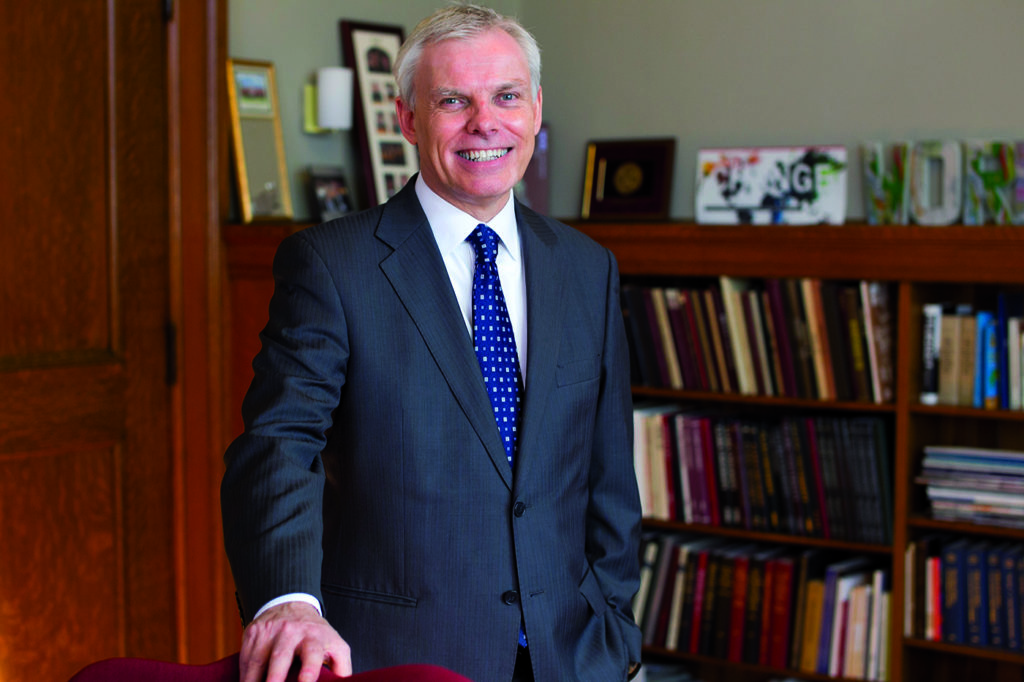
Clark University President David Angel announced today that he will be retiring as president of the University at the conclusion of his current contract in June 2020. Angel will continue to serve as president through the 2019–2020 academic year.
In a message to the campus community, President Angel expressed his gratitude for the opportunity to lead the University and for the contributions of so many to Clark’s success.
“It has been an extraordinary privilege to serve this University for more than 30 years, but, after much reflection and discussion with my wife, Jocelyne, I have concluded that this is the right time for us to seek out a new adventure and build another chapter in our lives. Clark has had just nine presidents in its history. Our next (tenth) president will have the opportunity to lead this amazing University and to work with students, faculty, and staff who are unmatched in terms of their passion and commitment to excellence,” Angel said.
Steven Swain ’89, the chair of Clark University’s Board of Trustees, congratulated President Angel for his accomplishments on behalf of Clark.
“We want to express our immense gratitude and appreciation to David and his wife, Jocelyne, for their unparalleled commitment to Clark University and for the exceptional leadership that David has provided as president,” Swain said.
Announcing the timeline for transition 18 months in advance will enable Clark’s Board of Trustees to put in place a comprehensive and careful search process. The Board indicated that it has already begun its work on the leadership transition and will provide more information about the process over the coming weeks.
About President David Angel
Angel was appointed as Clark University’s ninth president in July 2010. He had previously served as provost and vice president of Academic Affairs at Clark University from 2003–2010 and first joined Clark as a professor of geography in 1987. Summer 2020 will mark the completion of his thirty-third year at Clark University and his tenth year as Clark’s president.
While president, Angel has elevated Clark’s reputation as one of this country’s leading liberal arts research universities and significantly broadened support for Clark among alumni and other constituencies. Under his leadership, Clark has had great success in attracting an outstanding and increasingly diverse student body as well as a truly exceptional faculty. As a result of Angel’s efforts, Clark has been at the forefront of advancing existing models of liberal arts education, and the link between the classroom and the world at large, enabling graduates to possess the skills and capabilities they will need to flourish in career, life, and citizenship in the twenty-first century.
During Angel’s tenure, Clark also successfully undertook the largest fundraising campaign in its history. Campaign Clark had an original goal of raising $125 million. Thanks to the generosity of the largest number of donors that any Clark University fundraising campaign has ever seen, Clark has already significantly surpassed this goal and will continue to expand on this success through the end of the campaign on May 31, 2020.
Angel has guided investments in the Clark campus to ensure cutting-edge facilities support the educational mission. Major projects include the new Shaich Family Alumni and Student Engagement Center located across Main Street from Clark’s front gates. The Shaich building is innovative in many ways, including through its commitment to environmental sustainability — rooftop solar panels provide much of the energy for building operations. Clark has significantly upgraded its residence halls and other spaces to support the campus life experience. In 2016, the University opened a new track and field facility adjacent to the Boys and Girls Club of Worcester, making the facility available for use by neighborhood children. In early spring, the University will open the Colin Flug Graduate Study Wing as an expansion of their renowned Strassler Center for Holocaust and Genocide Studies.
Angel has worked tirelessly to further Clark’s commitment to being a diverse and inclusive community. He established the position of Chief Officer of Diversity and Inclusion at Clark University, established a Presidential Advisory Board on Diversity and Inclusion, and completed the first comprehensive survey of students, faculty, and staff on diversity and inclusion. Clark has also demonstrated leadership on efforts to reduce sexual violence on college campuses and on strengthening support for behavioral health.
Angel has also been committed to strengthening Clark’s presence in the Worcester community, particularly through the University’s partnerships in the Main South neighborhood. The University Park Partnership, established by President Richard Traina in the 1980s, and continuing on today, is a nationally recognized effort to link the success of Clark to the success of the neighborhood and city of which it is a part. Clark works with many community partners on issues of K-12 education, housing, neighborhood safety, health, and environmental improvement, and looks forward to continuing these significant collaborations in the future.
Outside of Clark University, Angel is especially active on issues of university accreditation. He recently stepped down as chair of the New England Commission on Higher Education, the accreditor for colleges and universities in the region.


